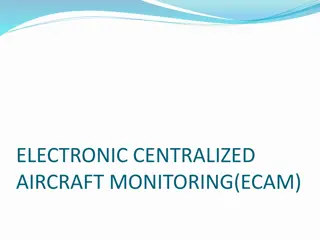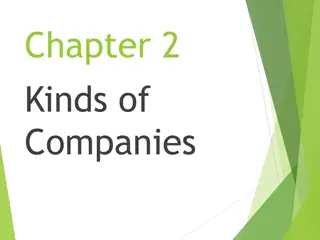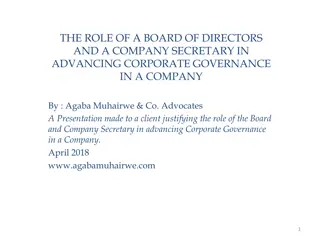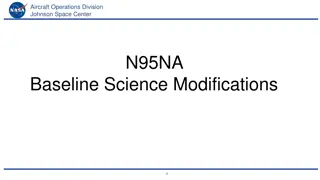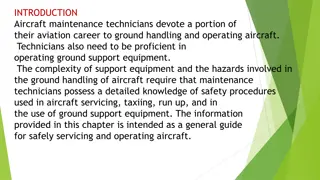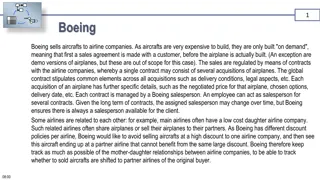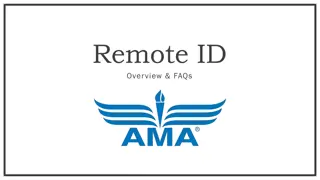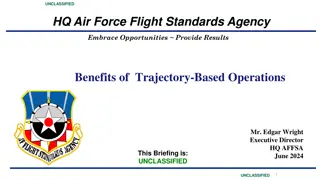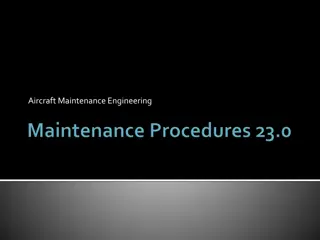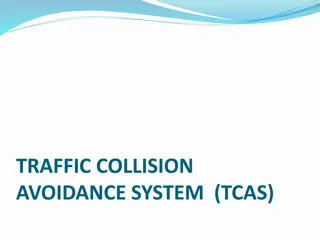Key Corporate Law Issues for Irish Aircraft Companies
Detailed discussion on key corporate law issues relevant to Irish aircraft companies, including principles of Irish Company Law, types of Irish companies, differences between LTD and DAC, corporate governance regime, duties owed to the company, and execution of documents like contracts and deeds.
Download Presentation

Please find below an Image/Link to download the presentation.
The content on the website is provided AS IS for your information and personal use only. It may not be sold, licensed, or shared on other websites without obtaining consent from the author.If you encounter any issues during the download, it is possible that the publisher has removed the file from their server.
You are allowed to download the files provided on this website for personal or commercial use, subject to the condition that they are used lawfully. All files are the property of their respective owners.
The content on the website is provided AS IS for your information and personal use only. It may not be sold, licensed, or shared on other websites without obtaining consent from the author.
E N D
Presentation Transcript
Key Corporate Law Issues for Irish Aircraft Companies S amus Cr in n & Gr inne Finneran 13 June 2023 M-70366737-2
What we will discuss Basic Principles of Irish Company Law Granting Security Key Irish law considerations around return of capital Key Irish Regulatory Requirements
Basic Principles of Irish Company Law Types of Irish companies Corporate Governance Overview Execution of Documents
Types of companies under Irish Law Private Company Limited by Shares (LTD Company) Designated Activity Company (DAC) Unlimited Companies Companies Limited by Guarantee (CLG) Public Limited Companies (PLC)
LTD VS DAC key differences DAC Company Model At least two directors Does need to hold an AGM where it has 2 or more members Constitution includes memorandum and articles of association LTD Company Model One director (separate secretary) Does not need to hold an AGM One document constitution
Corporate Governance Regime Certain approvals (e.g. financial assistance) Shareholders Board of Directors Delegated authority Powers of attorney Powers of attorney /resolutions Servicer/Third Party managers Attorneys/Authorised Signatories /resolutions
What duties are owed to the Company? Have regard to interests of members and creditors (only on insolvency) Power to exercise independent judgement not to be restricted Act in good faith in company s interests 8 Duties Codified Exercise reasonable care, skill and diligence Act honestly and responsibly Avoid Act in unauthorised conflicts of interest accordance with constitution/ use powers lawfully No unauthorised use of company property/ information/ opportunities
Execution of Documents - Contracts v Deeds Contract Deed When used? Most agreements/contracts Guarantees, security and where value/consideration is an issue 12 years from cause of action Not required for enforceability Additional execution requirements Limitation period Consideration Signature 6 years from cause of action Required for enforceability Simple signature
Sample Execution Blocks Execution under POA: Execution under seal: SIGNED and DELIVERED as a DEED for and on behalf of [Insert name of CHARGOR] by its lawfully appointed attorney GIVEN under the common seal of [Insert name of CHARGOR] ______________________ Director ____________________ Attorney _______________________ Director/Secretary in the presence of: ___________________ Witness Name: Address: Occupation:
Nature of document An instrument of POA is not generally required to be a deed (nor executed under seal) as a matter of Irish law Powers of attorney What / Where / Effect An attorney may execute deeds or any other document on the company s behalf, whether inside or outside the State. 02 Approval The directors of the company must approve the POA in advance. Execution of a document by an attorney who is not yet appointed cannot be ratified by the company. 01 03 Extent of power Where a company appoints an attorney, that attorney's power may be limited to a particular transaction or specific documents, or it may be a more general. More than one attorney may also be appointed. 05 04 Constitution Always check the constitution of the company to ensure there is nothing precluding POAs or prescribing how they should be executed.
Granting Security When to use Irish security Filing Requirements Financial Assistance
When to use Irish law security documents Irish When is Irish law security recommended ? Recognition of foreign law security generally immovable property (e.g. shares/bank accounts)
Filing Requirements Companies Registration Office S1001 Notice to Revenue Commissioner s Irish companies Foreign companies with registered branch in Ireland Security over book debts
Financial Assistance Irish law prohibits an Irish company from helping third parties to acquire its shares There are exemptions and a validation process available - but falling foul of the prohibition can have serious consequences for all concerned
Examples of transactions where financial assistance often arises 1 Acquisition finance (and variations or additions thereto) 2 Intra group re-organisations and tax planning structures 3 Share buy backs 4 Convertible bonds/Equity derivatives/Securities lending
SAP: Steps Involved The steps involved are: The company must grant authority for the carrying on of the restricted activity by passing a special resolution of the shareholder(s) of the company not more than 12 months before the commencement of the carrying on by the company of the restricted activity, such as the provision of financial assistance. All or a majority of the directors of the company must sign a declaration of solvency at a meeting of the directors held not more than 30 days before the matter is put to shareholders for approval. A copy of the declaration must be circulated to the shareholder(s). A key requirement is that within21 days of the commencement of the restricted activity (here, the provision of financial assistance), a copy of the declaration must be delivered to the CRO.
SAP: Directors Declaration The declaration of solvency must contain a number of statements including the purpose and nature and benefit of the transaction. The most important statement - that the declarants have made a full inquiry into the affairs of the company and that, having done so, they have formed the opinion that the company, having entered into the transaction or arrangement, will be able to pay or discharge its debts and other liabilities in full as the fall due during the period of 12 months after the date of the relevant act.
Key Irish law considerations around return of capital Dividends/Distributions Transactions at an undervalue Capital Contributions Share Transactions
Dividends/Distributions 1 2 What is a distribution? Section 123(1) CA 2014 Every description of distribution of a company s assets to members of the company, whether in cash or otherwise Requirement for Distributable Profits Section 117 CA 2014 profits available for distribution accumulated realised profits (not already distributed or capitalised) less accumulated realised losses (not already written off in a reduction or reorganisation of capital duly made) Distribution versus Dividend? Not always obvious company paying transaction fees invoiced to its shareholders. Mixture of law and accounting treatment but auditors unlikely to ever issue an opinion. Look at what the company is giving away versus what it is getting in return Be aware of potential restrictions on the profits - Pre-acquisition profits (Section 119 CA 2014)
Interim v Final Dividend Final Dividend Interim Dividend Paid after recently closed financial year from distributable profits. Paid from current accumulated profits. Calculated by reference to interim financial statements enable a reasonable judgment to be made as to the amounts of the relevant items Calculated by reference to last statutory financial statements. Section 123(1) CA 2014 Every description of distribution of a company s assets to members of the company, whether in cash or otherwise shareholders (AGM). Proposed by resolution of the directors and declared by ordinary resolution of the Determined by resolution of the directors, typically no shareholder resolution required but check the constitution. Can be paid once declared and in contrast with interim dividend, become a liability which, if unpaid, may be enforced by the shareholders. Can be paid once approved but may be withdrawn at any time before payment. 2 1
Transactions at an undervalue Transfer of assets at an undervalue deemed distribution Section 119 CA 2014 > Once company is solvent and has distributable profits available Sale at or above book value not a distribution even if market value is higher than transfer price Sale below book value is distribution of difference between the book value and transfer price distributable reserves to be reduced accordingly Potential solutions > Revalue the asset downwards so book value matches transfer price accountants will need to be involved. > Effect transaction at book value.
Capital Contributions No statutory/legal basis, commercial practice that has developed over time Unconditional, voluntary payment ( no-strings attached ) to subsidiary which is effectively treated as a gift Core features of a Cap Con: Non-refundable, irrevocable and unconditional in all respects Cash Cap Cons are typically treated as forming part of distributable reserves but this is not always the case for non-cash capital contributions: Best practice - board resolution in advance and agreement/letter Regular capital contributions can create risk of being treated as a taxable receipt
Share Transactions Subscription and Redemption Increasingly common to mitigate stamp duty. Share Capital Reduction Steps/Documents 3 2 1 Confirmation of reserves/ funding for redemption proceeds. If shares are not redeemable: New Constitution Shareholder Resolution Reduce issued share capital or share premium to create distributable reserves New shareholder subscribes for shares and shares held by existing shareholder are redeemed under Section 105 CA 2014. Facilitate payment of dividends (or create distributable reserves to fund redemption payment) Board Resolution Redemption payment must come from either Distributable reserves (105(2)(a)); or Proceeds of a fresh issue (105(2)(b)) (Note restrictions on redemption payment under Section 105(3)) Subscription and Redemption Agreement Summary Approval Procedure (incl. Auditors Report) or Court Approved 1. 2. NB: Always check constitution for company specific requirements
Key Irish regulatory requirements AML Schedule 2 Credit Reporting/Credit Servicing
Why is aviation leasing captured? The Criminal Justice (Money Laundering and Terrorist Financing) Acts 2010 2021 (the Act ) applies to designated persons Financial institution includes an undertaking that carries out one or more of the activities set out at reference numbers 2 to 12, 14 and 15 of the Schedule to the European Union (Capital Requirements) Regulations 2014 (reproduced at Schedule 2 of the Act) Designated persons include any person, acting in the State in the course of business carried on by the person in the State, who or that is - a financial institution
Schedule 2 Activities 1. Lending 2. Financial leasing 3. Payment services 4. Issuing and administering other means of payment (e.g. travellers' cheques and bankers' drafts) 5. Guarantees and commitments 6. Trading for own account or for account of customers in any of money market instruments, foreign exchange, financial futures and options, exchange and interest rate instruments or transferable securities 7. Participation in securities issues and the provision of services relating to such issues 8. Advice to undertakings on capital structure, industrial strategy and related questions and advice as well as services relating to mergers and the purchase of undertakings 9. Money broking 10.Portfolio management and advice 11.Safekeeping and administration of securities 12.Safe custody services 13.Issuing electronic money
Requirements for a designated person Risk Assessments (at business and customer level) Policies and Procedures Group-wide policies to be implemented by any DP in the Group Customer Due Diligence (CDD) Politically Exposed Persons (PEPs) Ongoing Monitoring Simplified CDD/Enhanced CDD Schedule 2 Firm Registration Regime -complete Registration Form and submit to CBI by email
Credit Reporting and Credit Servicing Lenders required to provide personal and credit information for credit applications/agreements to the CCR Generally speaking, it will only apply where the lender is a regulated financial service provider in Ireland or a foreign lender with an establishment in Ireland and borrower is an Irish company/has an address in Ireland Credit Reporting Act 2013 Credit Servicing Firms are required to obtain authorisation from the Central Bank in order to engage in the activity of credit servicing. Generally speaking, includes holding the legal title to credit granted under a credit agreement and associated ownership activities and consumer-hire and hire-purchase activities Consumer Protection (Regulation of Credit Servicing Firms) Act 2015





